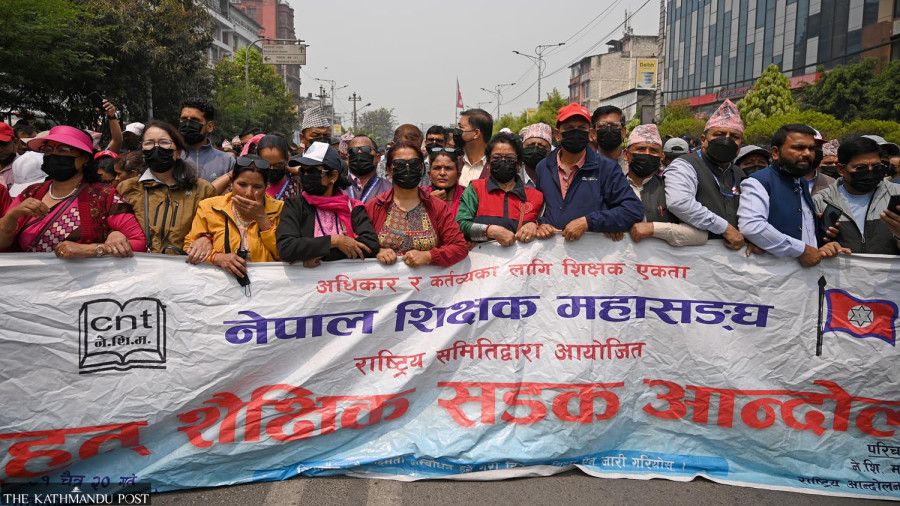Editorial
Address it early
With teachers announcing strikes, government inaction would jeopardise the future of countless students.
Around one and a half years ago, teachers across the country who had staged protests in Kathmandu returned to their schools and resumed teaching. They did so after reaching an agreement with the government on the School Education Bill. The Nepal Teachers’ Federation, an elected umbrella body of teachers’ unions that led the protests, had called off its Kathmandu-centric protests after a six-point agreement with the government. The central point of the agreement was the revision of the disputed School Education Bill, which was registered in the House of Representatives. However, the bill has since not seen the light of day. When President Ramchandra Paudel, on the government’s recommendation, prorogued the federal parliament session last week without endorsing the bill, agitated teachers once again took to the streets wearing black masks, demanding the immediate enactment of the School Education Act.
When the Constitution of Nepal 2015 adopted federalism, it gave local bodies autonomy over significant matters, including absolute authority over school education. However, almost 10 years later, Nepal’s school education is still governed by an outdated education Act created more than 50 years ago. So, the School Education Bill envisioned modernising and regulating school education in line with the constitution of the new polity by transferring most of the responsibility for managing school education to the local level. However, the teachers are against this very provision as they do not trust the local governments with fair school education management.
Undeniably, teachers’ conditions are often overlooked in Nepal, which is reflected in the declining appeal of the teaching profession. Each year, the government stresses students’ poor results in the Secondary Education Examination, yet it seldom addresses the welfare of teachers, who play a direct role in student performance. So their demands, including the monthly salary payment, pay and perks at par with the civil servants and a dedicated hospital for teachers, deserve a fair hearing. While their concerns regarding the local governments are valid, their demand to remain under the federal government also contradicts the principles of federalism. Local governments were entrusted with the responsibility of school education based on the understanding that they are better positioned to address the unique needs and challenges of their respective regions. However, teachers assert that these governments may treat them according to their political leanings, undermining their job security.
The issue of the School Education Bill is only getting knottier with time. The government’s knee-jerk responses in the past are further aggravating the situation. Clearly, the government had agreed to the teachers’ demands in 2023, including their wish to be under the federal government, which contradicts the constitution. Further, it even agreed to fill all seats of the temporary and relief quota through internal competitions for permanent posting. This is problematic as it will block the entry of freshers in teaching. Agreeing just to appease the protesting teachers while pushing vital reforms down the road will not solve the issue.
It is only natural for the teachers to protest if the promises made to them are not fulfilled. The government must find a way to balance the teachers’ demands with the core values of the constitution. If the government opts for the latter, it must take responsibility for any misconduct by local bodies that hinders the growth of teachers. With teachers announcing nationwide strikes, the authorities cannot afford to delay addressing the issue, as inaction would jeopardise the future of hundreds of thousands of students.




 9.89°C Kathmandu
9.89°C Kathmandu














